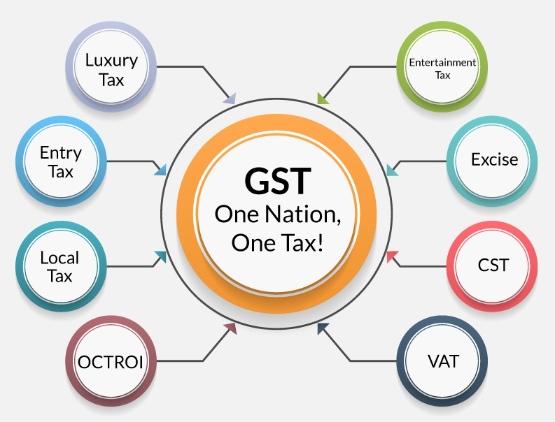GST - A New Beginning in Taxation
A taxation regime called Value Added Tax or VAT, as it is popularly known, is in play, especially in the developed countries. VAT aims to make taxation more progressive down the value chain and levy tax only on the value added by the business in that part of the value chain.
For instance, let's consider a furniture manufacturer selling an item for Rs.1 Lakh. They purchase certain raw materials for Rs.30,000 and pays an 18% Tax of Rs.5,400 on this raw material. When he sells this piece of furniture for Rs.1,00,000 or One Lakh, he charges his end customer Rs.18,000 in tax. When remitting tax to the government, he has to remit Rs.12,600 only as he has received Rs.5,400 from the supplier as credit towards GST charged to him. If he did not receive this credit, the end customer's price would be inflated. This causes an unnecessary increase in prices and results in double taxation.

In India, GST was introduced to remove double taxation and all the attendant inefficiencies and remove various other taxes such as octroi, luxury, excise, etc., and subsume all of them into one tax.
The problem with the Indian GST System
The Indian GST system is largely reasonably well implemented. It has made almost the entire system electronic and has brought everyone onto a single system making it easy for people to track GST on purchases and sales. The GST council continues to work on making the system more user-friendly.
However, the Indian GST system has a major flaw in it. It puts almost the entire control on the vendor or supplier for correct remittance of GST collected. And this results in loss of money or credit to buyers further down in the process.
How Smitha lost money on her GST Payment
This is what happened with Smitha (Name changed on request). Smitha had contracted with an interior design vendor to design and deliver a modular kitchen, wardrobes, and other interior additions to her newly purchased apartment.

Abhiram (Name changed on request) was contracted to carry out the work. The parties agreed to a total sum of Rs.4,10,000, and Abhiram began the work. An advance of Rs.1,00,000 or One Lakh was paid, and Abhiram began the work.
Abhiram initially looked like a credible person. However, it soon became evident that he was going to delay the project. What was to be a 15-day project turned out to be a 45-day project with significant delays. It took Smitha and her husband innumerable follow-ups to get the project completed.
Upon final completion, Abhiram presented a final bill of Rs.4,13,300 which they mutually rounded off to Rs.4,10,000. This was to include a GST component of Rs.63,534. Although Abhiram was paid the entire amount as agreed, Abhiram remitted only Rs.52543 as GST. This resulted in a loss of Rs.10,991 to Smitha as she had to remit the higher amount to the government as GST due to this short remittance by Abhiram.
Due to the strained relationship from the project and after numerous follow-ups asking Abhiram to provide the updated invoice, Smitha gave up. She wishes nobody goes thru the same experience. However, short remittance of GST is a common aspect of India's GST System. There are no support options that exist to recover this amount. Even when authorities intervene, it is with large amounts only. By and large, other people are left without any recourse.
Can GST Short remittance be avoided?
GST short or non-remittance is not a new occurrence. We had written in one of our earlier blogs how thousands of crores of TDS and employee TDS had not been paid to the Government. This happens because there is no escrow mechanism to address this.
Although not required by law, reputed companies in India route tax payments thru an escrow account. This not only makes it easy for the company to track taxes separately it also makes it easy to make and receive tax payments with ease. Banks and several institutions globally in mature markets also follow this practice.
Taking Smitha's case as an example, Smitha would split the entire amount of Rs. 4,10,000 into GST of Rs.63534 that would be remitted via a digital escrow account towards taxes and Rs.3,46,466 would be paid directly to Abhiram. This would make it easy for both to manage their tax obligations. A digital escrow created for this purpose would make it super easy for both parties to transact with ease.
Here is how a buyer can avoid GST short remittance:
1. Obtain GST certificate of Vendor - Before making any payments, buyer should ensure that the vendor is registered with GST. This can be ascertained easily with the help of the GST registration certificate
2. Check Invoices - check the invoice for appropriate calculation and rates applied for GST. Determine which are eligible and which ones are not
3. Split the payment into GST and direct payment. Choose a digital escrow platform such as Vouch to remit GST into a separate account and the vendor payment into a separate account. Since digital escrow platforms hold the money till the buyer and seller have settled the transaction to their mutual satisfaction, it helps both immensely.
Remember, when you have to get credit for the GST paid, it is as good as your own money. Use a Digital Escrow Platform such as Vouch to manage the entire transaction to ensure you never lose your money.
What is digital escrow?
Digital Escrow is the use of a third party account, during a transaction, which holds the money deposited by the buyer until the seller fulfills the terms of the agreement. The transacting parties are supervised by the escrow company.
What is Vouch Digital Escrow?
Vouch Digital Escrow uses a non-interest-bearing escrow account for all transactions in India and keeps you updated and informed at every step of the transaction process till the end. Vouch’s professionals are always available to assist you with all queries that you may have during the entire transaction process. There is no scope for deceit or fraud since the payments, shipping, delivery, and execution are carried out under the honest and watchful eyes of the Vouch’s professionals. With Vouch, any business transaction becomes transparent, uncomplicated, and hassle-free.
· · ·
This is Fraud Story #37. Check back here for more fraud stories and scams that you can protect yourself from.
Safety is not just about protecting your credit or debit card number. It's about having control of your money till you have had the opportunity to settle your transaction with the other party.
· · ·
Note: This is a good-faith initiative to educate the world about how to avoid frauds like these. Do you have a fraud that you would like to report? Please write to us at letstalk@iamvouched.com







